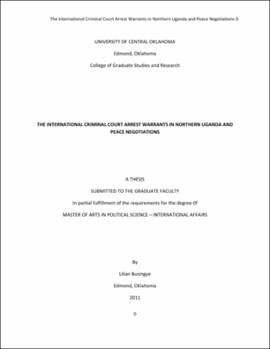| dc.contributor.advisor | Furmanski, Louis S. | |
| dc.contributor.author | Busingye, Lilian | |
| dc.date.accessioned | 2020-05-26T20:37:35Z | |
| dc.date.available | 2020-05-26T20:37:35Z | |
| dc.date.issued | 2011 | |
| dc.identifier.other | (AlmaMMSId)9978544385202196 | |
| dc.identifier.uri | https://hdl.handle.net/11244/324673 | |
| dc.description.abstract | For more than two decades, the Lord's Resistance Army (LRA) has been engaged in armed conflict against the government of Uganda. Under the leadership of Joseph Kony, the LRA is responsible for atrocities that include forced abduction; abuse of children and turning them into child soldiers; gruesome indiscriminate murders; mutilation; torture and rape of civilians; and looting and destruction of property. Over the last several years, the government of Uganda has pursued multiple strategies to end the war. In addition to military efforts, the government tried to engage the LRA in peace talks directed at ending the conflict. This presented the best chance to end the nation's devastating civil war. With the LRA's disregard of peace talks and continuous terrorizing of the population, the Ugandan government used its position of having ratified the Rome Statute to refer the crimes of the LRA to the International Criminal Court (ICC). The ICC prosecutor initiated an investigation and in July 2005 issued arrest warrants for Kony and four of his top commanders, two of whom are alleged to have since died. Recent developments indicate that the government of Uganda would prefer for the ICC to withdraw the arrest warrants if the accused agreed to undergo a tribal justice ritual that requires a public confession, and an apology without threat of incarceration. The Ugandan government would also favor a plan that supplements this traditional justice system with more formal court proceedings for those accused of the most serious crimes. In response, the rebels have said they will not engage in any peace negotiations, and they have singled out the ICC arrest warrants as the main reason and have called for their withdrawal. Situations from Sudan, The Democratic Republic of Congo, and Central African Republic are briefly analyzed for comparative purposes and to offer the reader a general insight into the ICC intervention in Africa. This study is to investigate the possibility that the ICC arrest warrants have interfered with the peace negotiations to end this civil war. | |
| dc.rights | All rights reserved by the author, who has granted UCO Chambers Library the non-exclusive right to share this material in its online repositories. Contact UCO Chambers Library's Digital Initiatives Working Group at diwg@uco.edu for the permission policy on the use, reproduction or distribution of this material. | |
| dc.subject.lcsh | Atrocities | |
| dc.subject.lcsh | Transitional justice | |
| dc.title | The International Criminal Court arrest warrants in northern Uganda and peace negotiations | |
| dc.type | Academic theses | |
| dc.contributor.committeeMember | Muhamed, Husam | |
| dc.contributor.committeeMember | Shin, Youngtae | |
| dc.thesis.degree | M.A., Political Science - International Affairs | |
| dc.identifier.oclc | (OCoLC)ocn840653799 | |
| uco.group | UCO - Graduate Works and Theses::UCO - Theses | |
| thesis.degree.grantor | Jackson College of Graduate Studies | |
